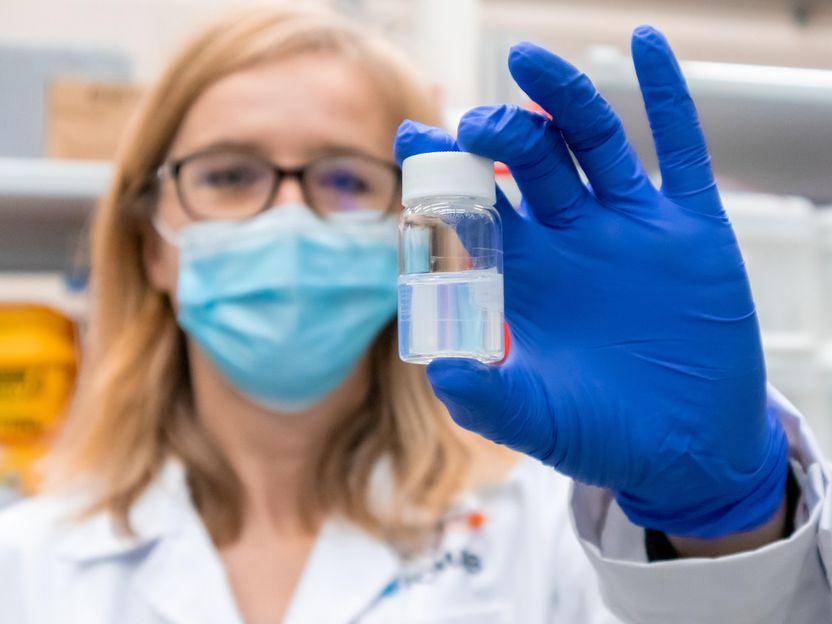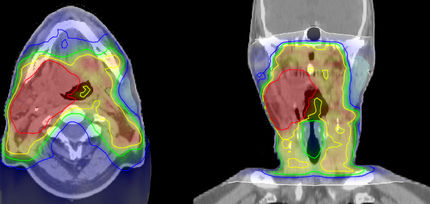Nanocapsules with microRNA designed to be introduced into cells to treat diseases such as cancer
Lipid nanostructures carrying molecules that interfere with tumor propagation machinery.
A multidisciplinary team with CSIC researchers has designed new nanocapsules (nanovesicles) that allow encapsulation of a molecule (microRNA) for administration in the treatment of tumors. These small RNA molecules can interfere with other RNA strands (specifically, messenger RNA), which disrupts the basic machinery of cells and is useful, for example, to alter or interrupt the spread of tumor cells. The results are published in Small and Advanced Materials.

ICMAB researcher Mariana Köber, with a sample of nanovesicles.
ICMAB
"These nanovesicles, or quatsomes, consist of a nanostructure composed of two closed lipid layers. They function as capsules that would make them stable in the bloodstream and facilitate their entry into cells. In this way they could be applied in patients," explains Nora Ventosa, a researcher at the Institute of Materials Science (ICMAB), who participated in the study.
These nanovesicles can be coupled with the microRNA and injected intravenously into the body to administer them in organs with tumors, such as the liver or lung, with greater success and stability than if the miRNA were injected alone. "Once delivered, the microRNA interferes with cell proliferation and survival-related genes in tumors, which reduces the rate of tumor growth," adds the researcher.
These nanovesicles are the result of the work of a multidisciplinary team formed by researchers from the Institute of Materials Science of Barcelona, ICMAB-CSIC, the Vall d'Hebron Research Institute (VHIR)-UAB, the Vall d'Hebron Institute of Oncology (VHIO), the Institute of Bioengineering of Catalonia (IBEC), the Barcelona Institute of Science and Technology (BIST), the CIBER network of Bioengineering, Biomaterials and Nanomedicine (CIBER- BBN), the company Nanomol Technologies SL, the Technion - Israel Institute of Technology and the Institute for Complex Molecular Systems (ICMS).
These nanovesicles have optimal properties for encapsulating microRNA: they are less than 150 nanometers in size and are stable in liquid solution for more than 6 months; they also have adjustable pH sensitivity, which means that different pH levels can trigger different responses.
"What is interesting about these nanovesicles, known as quatsomes, is that they can be easily engineered for the delivery of a wide variety of nucleic acids. Importantly, these new nanovesicles are stable at room temperature, which avoids problems associated with cold chain requirements," adds Ventosa.
The production of these nanovesicles has been optimized with their final application in mind and to ensure their use in clinical and patient trials. Through a one-step, environmentally friendly and scalable process called DELOS, the researchers have designed a procedure that complies with Good Manufacturing Practice (GMP) guidelines established by the European Union.
This study has demonstrated the functionality of quatsomes in microRNA delivery in a common solid extracranial tumor in pediatric cancer cases known as neuroblastoma, which is responsible for approximately 15% of all pediatric cancer deaths and lacks therapies for high-risk patients. The results show that quatsomes protect microRNA from degradation and increase its presence in tumors of the liver, lung, and neuroblastoma xenografts, among others.
Note: This article has been translated using a computer system without human intervention. LUMITOS offers these automatic translations to present a wider range of current news. Since this article has been translated with automatic translation, it is possible that it contains errors in vocabulary, syntax or grammar. The original article in Spanish can be found here.
Original publication
A. Boloix, N. Feiner-Gracia, M. Köber, J. Repetto, R. Pascarella, A. Soriano, M. Masanas, N. Segovia, G. Vargas-Nadal, J. Merlo-Mas, D. Danino, I.l Abutbul-Ionita, L. Foradada, J. Roma, A. Córdoba, S. Sala, J. Sánchez de Toledo, S. Gallego, J. Veciana, L. Albertazzi, M. F. Segura, N. Ventosa; "Engineering pH-Sensitive Stable Nanovesicles for Delivery of MicroRNA Therapeutics."; Small, 18, 3, 2022.






















































